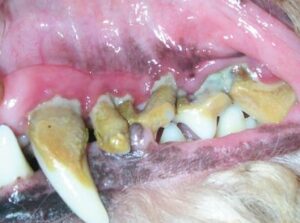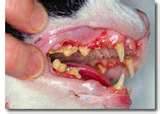
Pet Dental Health
How much do you know about your pet’s teeth? Sadly, many pet owners don’t think about their pet’s teeth often enough with the result that 80% of dogs and 70% of cats suffer from dental disease by the age of three. This can have a significant impact on their overall quality of life. Imagine how your mouth would feel (and smell!) if you never brushed your teeth. Imagine having a really bad toothache and not being able to tell anyone about it. Our pets feel pain just like we do, but they are not always able to let their owner know when they are uncomfortable or sore. Dogs with bad breath are not normal and usually have a degree of dental disease that needs to be treated. Cats have a nasty array of bacteria in their mouths that can contribute to gingivitis (inflamed gums) and poor hygiene.


In most cases, owners are unaware that there is a problem, not because they don’t care about their pets, but because these problems are hidden away in the mouth. Most animals will continue to eat despite advanced disease, because they would rather eat (even if it’s painful) than go hungry. Bad breath and subtle behavioural changes may be the only hints until the pain becomes unbearable. Drooling, dropping food and reluctance to eat or be handled around the face may eventually become more obvious signs that something is wrong. Unfortunately for our pets, it may take years for such signs to develop.
To help you keep your pet’s teeth healthy, consider the following ten tooth truths:
- Tooth disease is the commonest disease seen in pets.
- If your pet has bad breath, it probably has dental disease.
- Pets with tooth decay show behaviour changes.
- Some breeds of dogs and cats are more prone to dental disease.
- Dental Disease can cause irreversible damage.
- Dental Disease affects organs other than teeth.
- Soft foods make a pet’s teeth dirty.
- Bones and good quality dry food help to keep a pet’s teeth clean.
- Brushing a pet’s teeth is the best way of keeping a pet’s teeth clean.
- Regular Check Ups.
Daily brushing remains the gold standard for plaque prevention
As most of you will have experienced, every patient that we see at Clayfield Veterinary Clinic has its teeth checked and we advise owners if their pets require dentistry be performed. If you are concerned about your pet’s teeth and would like some advice, contact us via our Contact Us page or call us on 07 3262 1988.